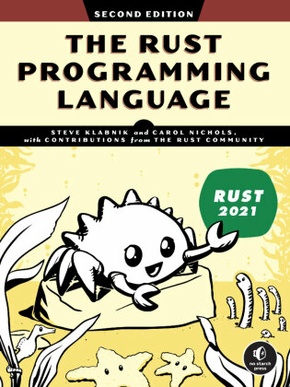
The Rust Programming Language, 2nd Edition
| Verlag | No Starch Press |
| Auflage | 2023 |
| Seiten | 560 |
| Format | 18,0 x 3,1 x 24,0 cm |
| Gewicht | 1034 g |
| Artikeltyp | Englisches Buch |
| EAN | 9781718503106 |
| Bestell-Nr | 71850310UA |
With over 50,000 copies sold, The Rust Programming Language is the quintessential guide to programming in Rust. Thoroughly updated to Rust s latest version, this edition is considered the language s official documentation.
The Rust Programming Language "covers everything you could want to know about the language." Stack Overflow
Rust has been repeatedly voted "Most Loved Language" on the StackOverflow Developer Survey.
The Rust Programming Language, 2nd Edition is the official guide to Rust 2021: an open source systems programming language that will help you write faster, more reliable software. Rust provides control of low-level details along with high-level ergonomics, allowing you to improve productivity and eliminate the hassle traditionally associated with low-level languages.
Klabnik and Nichols, alumni of the Rust Core Team, share their knowledge to help you get the most out of Rust s features so that you can create robust and scalable programs. You ll begin with basics like creating functions, choosing data types, and binding variables, then move on to more advanced concepts, such as:
Ownership and borrowing, lifetimes, generics, traits, and trait objects to communicate your program s constraints to the compilerSmart pointers and multithreading, and how ownership interacts with them to enable fearless concurrencyHow to use Cargo, Rust s built-in package manager, to build, document your code, and manage dependenciesThe best ways to test, handle errors, refactor, and take advantage of expressive pattern matching
In addition to the countless code examples, you ll find three chapters dedicated to building complete projects: a number-guessing game, a Rust implementation of a command line tool, and a multithreaded server.
Inhaltsverzeichnis:
Foreword
Preface
Acknowledgments
Introduction
Chapter 1: Getting Started
Chapter 2: Programming a Guessing Game
Chapter 3: Common Programming Concepts
Chapter 4: Understanding Ownership
Chapter 5: Using Structs to Structure Related Data
Chapter 6: Enums and Pattern Matching
Chapter 7: Managing Growing Projects with Packages, Crates, and Modules
Chapter 8: Common Collections
Chapter 9: Error Handling
Chapter 10: Generic Types, Traits, and Lifetimes
Chapter 11: Writing Automated Tests
Chapter 12: An I/O Project: Building a Command Line Program
Chapter 13: Functional Language Features: Iterators and Closures
Chapter 14: More About Cargo and Crates.io
Chapter 15: Smart Pointers
Chapter 16: Fearless Concurrency
Chapter 17: Object-Oriented Programming Features
Chapter 18: Patterns and Matching
Chapter 19: Advanced Features
Chapter 20: Final Project: Building a Multithreaded Web Server
Appendix A: Keywords
Append ix B: Operators and Symbols
Appendix C: Derivable Traits
Appendix D: Useful Development Tools
Appendix E: Editions
Index
